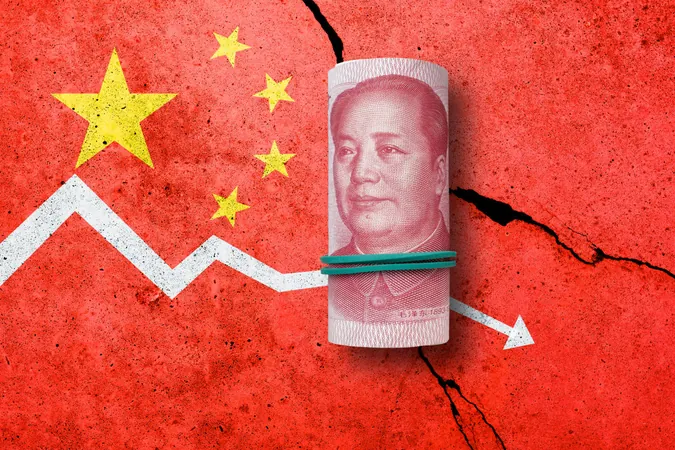
Will China's Stock Rally Rebound? Investors on Alert after Recent Market Drop
2024-10-08
Author: Wai
Introduction
China's recent stock market rally came to an abrupt halt as investors were left disappointed by the government's decision not to announce another substantial stimulus package.
On Tuesday, Hong Kong's Hang Seng Index (^HSI), which is heavily weighted with major Chinese companies, plummeted nearly 9%, marking its most dramatic decline since the financial crisis in 2008. This sharp decline followed an incredible rise of approximately 20% over the previous month, spurred by China's most aggressive monetary stimulus since the pandemic began.
Market Volatility
China's benchmark CSI 300 index saw similar volatility, initially soaring by 10% after markets reopened from a weeklong holiday, only to end the day with a more modest 6% increase.
Investors had anticipated a more significant stimulus announcement as part of China's campaign to revive its struggling economy, but to their dismay, this did not materialize.
Government's Stimulus Plan
The government first unveiled its stimulus plan on September 24, which aimed to counteract the challenges faced by the second-largest economy, primarily driven by deflation concerns arising from a weak property market and low domestic demand.
Following the announcement, there was a surge in investment inflows, particularly into sectors like real estate and consumer staples, as market players expressed newfound confidence in a Chinese economic rebound.
Analysts' Perspectives
However, Wall Street analysts remain divided on whether this is the optimal time to invest. Jeremy Schwartz, Chief Investment Officer at WisdomTree, expressed cautious optimism, stating that while there is a sense of improved sentiment, the actual efficacy of the stimulus in lifting the economy is still uncertain.
The measures included interest rate cuts, reduced reserve requirements for banks, increased liquidity for stock markets, and mortgage relief—yet skepticism persists regarding their impact.
Commitment to Growth Targets
During a press conference held by China's National Development and Reform Commission (NDRC), officials reiterated their commitment to achieve an annual growth target of around 5%.
Chairman Zheng Shanjie acknowledged the "complex and extreme" challenges posed by the current global environment but remained optimistic about the country's economic recovery.
Fiscal Allocation and Expectations
In addition to the economic pledges, the NDRC announced an allocation of 200 billion yuan ($28 billion) to local governments for spending and investment initiatives.
Nevertheless, many economists had been anticipating a more significant fiscal package, possibly around 2 trillion yuan ($284 billion).
Mixed Sentiment in Other Indices
Other Chinese stock indices also reflected this mixed sentiment; the Shanghai Composite (000888.SS) gained about 5% after starting the day higher.
The index has surged over 20% from its lows earlier in September, buoyed by positive investor sentiment.
Performance of Chinese Tech Giants
Chinese tech giants, including Alibaba (BABA) and PDD Holdings (PDD), have enjoyed substantial gains over the last month, reporting increases of over 35% and 55%, respectively, even amidst the Tuesday market turmoil.
Caution for Long-term Investors
Analysts stress the need for strategic moves in this volatile environment.
WisdomTree's Schwartz warned long-term investors about the complexities, particularly due to existing geopolitical tensions and the forthcoming US elections.
The stark contrast between China's communist framework versus the democratic setups of nations like Japan and India has raised questions among investors about potential rewards in these markets.
Opportunity Amidst Recovery
Despite the recent downturn, some experts believe the Chinese market has only just begun its recovery.
Brendan Ahern, Chief Investment Officer at KraneShares, argued that the current economic landscape may present a prime opportunity for investors willing to adopt a forward-looking perspective rather than dwelling on past performance.
Upgrading Sentiment by Financial Heavyweights
Goldman Sachs has added to the bullish sentiment, recently upgrading China stocks from Marketweight to Overweight, envisioning potential upside of 15-20% for major indices.
Other financial heavyweights, including HSBC and BlackRock, have similarly adjusted their outlook on Chinese equities, suggesting that the market may still possess considerable upside.
Looking Ahead
Nevertheless, as economic conditions evolve, the crucial question remains: will additional fiscal stimulus effectively rejuvenate key sectors like real estate, and how will these changes influence global economic trends?
Optimism persists, but many analysts caution that the financial trajectory heavily relies on the scale and execution of the proposed measures, details of which are yet to unfold.
Conclusion
Investors are undoubtedly on high alert as they navigate these uncertain waters, eagerly awaiting the next moves from Chinese policymakers.



 Brasil (PT)
Brasil (PT)
 Canada (EN)
Canada (EN)
 Chile (ES)
Chile (ES)
 España (ES)
España (ES)
 France (FR)
France (FR)
 Hong Kong (EN)
Hong Kong (EN)
 Italia (IT)
Italia (IT)
 日本 (JA)
日本 (JA)
 Magyarország (HU)
Magyarország (HU)
 Norge (NO)
Norge (NO)
 Polska (PL)
Polska (PL)
 Schweiz (DE)
Schweiz (DE)
 Singapore (EN)
Singapore (EN)
 Sverige (SV)
Sverige (SV)
 Suomi (FI)
Suomi (FI)
 Türkiye (TR)
Türkiye (TR)